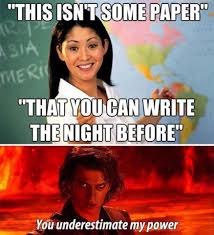My hope is that students feel that Writing 101 was a foundation for the kind of research-intense work we’ve done in Writing 102. From my own observations, students were more engaged in working with the NYT last semester than my first year Writing 101 students were in the Norton textbook. It led easily to 102 in that students were already aware of the topics that built the most kairos in a sense. I felt that many of the topics covered in especially the opinion part of the NYT led well into the cultural myths explored in 102. It prepared students for the kind of engagement in social issues that came with the Writing 102 theme. Student writing improved in some ways, but I feel like the most growth happened in students who were already driven in Writing 101 and really pushed themselves to be better researchers and stronger academics in 102. I’m hoping the semester has given students a confidence in their writing that they may not have had without the first year writing sequence.
Category Archives: Daily Write
Daily Write, 4/20
Daily Write 4/20: At This Point In The Semester…
My Writing Rules
As a student, I was taught to write the five-paragraph essay in my earliest years of academic writing (I’d say it started around middle school and lasted until my junior year of high school). We would have to offer up three points for our thesis statement, and then we would make sure the three body paragraphs aligned with our three points. We’d write a weak conclusion that was basically a word-for-word retelling of our intro. I remember that it was the start of hating academic writing and loving creative writing for me.
Thankfully, a woman named Joyce Helmick and a man named George Wilson together broke this mold for me. In my AP History class, Mr. Wilson taught us to be open to creativity in academic writing. To always consider audience and purpose of every assignment. Mrs. Helmick taught me to be flexible to the genre of each assignment. She felt it was a skill one needed to master to understand the difference between a persuasive essay, a poem, a researched thesis, a short story, etc. No genre was above another one; it’s up to us to be able to have the talent to approach each assignment for what it is…not what the last paper was.
As a writing teacher, my writing rules consist of the following (and I’m sure there are many more):
- Appreciate the parameters of each assignment. You will not always like every type of paper, but having the stamina and skill to approach every writing project is good training for life.
- Always consider audience before approaching an assignment. That’s how you’ll find your writing voice. Don’t expect it to be the same for every assignment.
- Teachers have to post word count minimums. Believe me, we wish we didn’t have to. But, if we don’t, some students mistake that for not needing to explore the assignment fully. But, even if you see a word count, try to ignore it. Just write. Most of the time, if you are truly fulfilling the assignment, word count will not be an issue.
- Always engage your reader.
- Don’t forget the rhetorical triangle. We don’t discuss it just to analyze stuff in Writing 101. We discuss it because it is the cornerstone to good writing across the board. How do you build your own credibility in your work? How are you supporting your claims with strong logical evidence? How are you engaging your reader’s passion and emotion for your topic?
- How will you BEST serve your topic? In an academic argument, your topic is BEST served by remaining objective. Remember, it’s about the parameters of the assignment, the genre. You want to consider that when making writing decisions.
- Inquiry is key. If you don’t care about your topic, it will be very apparent in your writing. Caring counts.
Causal Argument Proposal Draft
At the start of my research, I asked the question, “Why are kids being bullied?” I believe this is a prevalent issue as we see a increased number of children being bullied in the United States. Actions such as bullying make children feel unsafe and scared at school which leads to withdraw from school and people. My research has led me to believe that across the United States children are being bullied and school authorities just let it happen because “kids are just being kids”. The lack of redirection of this problem from school faculty and officials is alarming and my research suggests that this could have a huge impact in a child’s mental health and future.
For my causal argument, I plan to explore the causal relationship between the bullying at school, and teen suicide rates. Some studies conducted in my research found that children being bullied suffer from higher rates of depression and suicide than children that aren’t being bullied. I plan to address how bullied can lead to attempted suicides and suicides. I plan to mention the effects bullying has on all victims of abuse but in my causal argument, I plan to focus specifically on how the lack of intervention in bully cases can lead to an increase in teen suicides. My working thesis at this point is this:
Living in America, the land of freedom, as a child that is been bullied at school seems like a never ending terror. Instead, many children will think of ending their lives and have a high rate of attempting or committing suicide due to the lack of intervention to stop this problem.
Daily Write 3/7
KD told me that i really needed to add a couple sentences, because I was not doing a good job comparing the sources. I also wasn’t doing a good job reflecting which is a major part of this project. I still have a lot of work to do.
What was helpful today?
Today, I enjoyed participating in peer-review and also allowing my partner to steal ideas. Once again, I didn’t get much feedback because my partner told me my project was excellent. However, I know there is always room for improvement so I will seek it from other places like my teacher and the workshop on Thursday.
Daily Write: Librarian Insight
What I found that was most helpful was how she broke the topics down into a web so that we can research it easier. I think it really showed me how to break my down and analyze it better to do my research. I really enjoyed the refresher on how to work one research.
Daily Write 2/22/16
I’m not sure what I want to talk about in my annotated bibliography, but I have a connection to the bullying video. The myth of bullying is that “boys will be boys”, or they’re only children. Yes, they are only children, but children can be very mean. Bullying is serious, and shouldn’t be taken so lightly. I have a personal connection to being bullied, and I went through an emotional time. I was only 8 years old, but I understood what was happening to me and I didn’t deserve the bullying. I defended myself by informing someone; therefore,I wasn’t bullied again. Being bullied can drive you emotionally unstable, or to sucide. Do bullies bully because their environment is unstable? How would they feel if someone bullied them. Being different is what makes us unique, not weird!
Daily Journal 2/22
I have decided to do my research on the LGBT group and Religious organizations that go against the LGBT community. Both communities are considered rivals of each other, I want to research the problems this rivalry causes.



